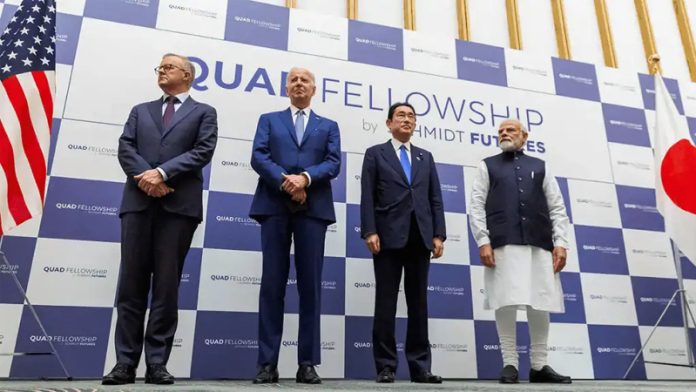The Quad Foreign Ministers’ meeting in Tokyo marks a significant milestone in the global fight against terrorism. It underscores the four-nation grouping’s commitment to a free and open Indo-Pacific. With India, the US, Japan, and Australia at the helm, the Quad has sent a strong message to both state and non-state actors that terrorism and coercion will not be tolerated. In a joint statement, the Quad unequivocally condemned terrorism and violent extremism in all its forms, including cross-border terrorism. The Ministers condemned the use of UAVs, drones, tunnels, and information and communication technologies by terrorists. This condemnation is particularly pertinent given the increasing use of these technologies by terrorist groups to orchestrate attacks and spread their propaganda.
The call for concerted action against UN-listed terrorist groups, including Lashkar-e-Toiba (LeT) and Jaish-e-Mohammad (JeM), is a clear reference to Pakistan, which has been repeatedly accused of providing safe havens to these and other terrorist organizations. The Quad’s insistence on immediate, sustained, and irreversible action to prevent territory from being used for terrorist purposes is a direct challenge to Pakistan’s long-standing complicity in fostering terrorism. Simultaneously, by reiterating the condemnation of the 26/11 Mumbai and Pathankot attacks and demanding justice for the perpetrators, the Quad emphasises the importance of accountability. This stance is crucial in ensuring that those responsible for heinous acts of terrorism are brought to justice, thereby deterring future attacks. Moreover, the Quad’s commitment to working together to promote accountability for perpetrators of terrorist attacks extends to supporting the implementation of UN Security Council resolutions related to sanctions. This collaborative approach enhances the global community’s ability to respond effectively to terrorism and underscores the importance of international cooperation.
In addition to addressing terrorism, the Quad reaffirmed its steadfast commitment to a free and open Indo-Pacific, emphasising the need for a region free from coercion. This statement, though not explicitly naming China, clearly addresses Beijing’s increasingly aggressive manoeuvres in the East and South China Seas. By calling out the dangerous use of coast guard and maritime militia vessels, the Quad highlights the importance of maritime security and the need to protect the rights of countries to exploit their offshore resources without interference. The Quad’s opposition to unilateral actions that seek to change the status quo by force or coercion highlights the importance of upholding the rules-based global order and respecting sovereignty and territorial integrity. The Quad’s focus on developing a trusted, secure, and robust telecommunication network, including the rollout of Open Radio Access Networks in Palau, is a significant step towards enhancing regional security and resilience. This initiative aims to counter China’s dominance in the telecom sector and ensure that smaller nations have access to secure and reliable communication infrastructure.
Practically now, the Quad is not a “talk shop” but a platform that generates practical outcomes. This assertion is reflected in the group’s proactive measures to address terrorism and regional security challenges. The Quad’s engagement in counter-terrorism efforts, including the fruitful discussions held at the first Quad Working Group on Counter-Terrorism meeting and the upcoming tabletop exercise in Japan, is a big victory for India, particularly. The joint statement also expressed deep concern over the war in Ukraine, reiterating the need for comprehensive, just, and lasting peace in line with international law. This position aligns with the Quad’s broader commitment to upholding the principles of the UN Charter, including respect for sovereignty and territorial integrity.
Given the recent geopolitical situation and the presence of multiple conflict zones, the united stance taken by the Quad Nations is commendable. The decisions will significantly impact the fight against terrorism and enhance security across various regions. Individually, each of these four countries is a formidable force; collectively, their joint decisions on global issues hold immense importance. This proactive approach positions the Quad as a pivotal force in countering terrorism and coercive actions in the Indo-Pacific region.
Trending Now
E-Paper


